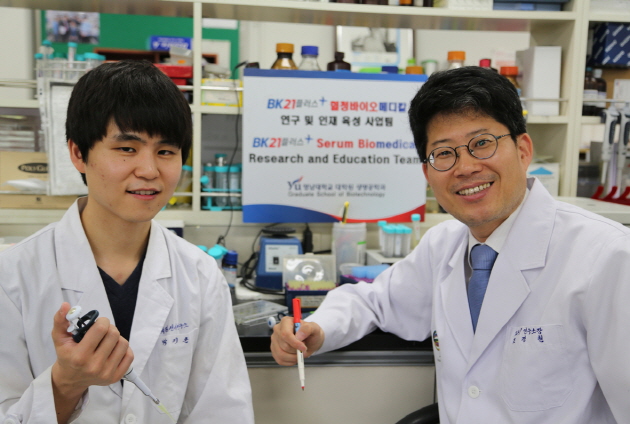Professor Cho Gyeong-hyeon's research team scientifically explains 'dangers of trans fat'
Published in international academic journal in the top 3% in the nutritional biochemistry and molecular nutritional science fields
Expected to be used as basic data to establish food safety management standards and recommended daily consumption standards
[June 18, 2014]
"Exactly how and where is trans fat harmful?"
The School of Biotechnology's Professor Cho Gyeong-hyeon research team found clues on the harms of trans fat, which was just vaguely known to be harmful.
Professor Cho's team proved that trans fat lowers the function of high density lipoproteins (HDL) causing cell toxicity and blood vessel toxicity. HDL, which is known to be the 'blood vessel cleaner' that removes wastes piled inside the vessels, was found to be transformed by trans fat and due to this, HDL is unable to perform its functions.
Trans fat is a solid fat made by adding hydrogen to unsaturated fatty acid in the liquid state. It is easy to store and improves tastes, and is thus used for long-term preserved foods and instant foods. They are commonly used in fried processed foods such as cookies, doughnuts, chicken and popcorn. Excessive consumption can lead to diabetes, cardiovascular diseases, breast cancer and colon cancer, and can increase risk of deformities. However, the exact cause of disease and the reason for its toxicities have not yet been revealed.
The research team used zebra fish (carp that has similar genetic structures with humans and lays hundreds of eggs making it suitable for mass genetic function research and for verification of new drugs and toxicities) to discover that trans fat transforms serum HDL (high density lipid). Moreover, the research team found in zebra fish that consumed trans fat for 20 weeks that consumption of trans fat worsened fatty liver and liver inflammation, while also causing skin cell aging, embryo poisoning and developmental disabilities.
Professor Cho Gyeong-hyeon explained the reason for research saying, "We started this research thinking that it is important to reveal exactly how trans fat is harmful since many people enjoy eating trans fat despite knowing that it is unhealthy," and added, "The achievement of this study is that it revealed that trans fat causes not only cardiovascular poisoning, but is also toxic for skin, embryo and fatty liver." He also stated, "We hope that the results of this study will be used as basic data to provide food safety management standards or daily recommended amounts by the Ministry of Health and Welfare and the Ministry of Food and Drug Safety."
This research, which was carried out with the support of the BK21 Plus Project and general researcher support project hosted by the Ministry of Environment and the senior researcher support project pursued by the Ministry of Science, ICT and Future Planning, was published in the May 26 online issue of <Molecular Nutrition & Food Research (IF; impact factor 4.310), an international academic journal in the top 3% in the nutrition biochemistry and molecular nutrition field. The primary author of this research paper was researcher Park Gi-hoon (25), who was in the first batch of students of the YU School of Biotechnology and currently enrolled in a combined master's and PhD course, while Professor Cho participated as a corresponding author.
Earlier, Professor Cho's research team became the first in the world to explain that smoking promotes skin aging. The research team published in the May 2014 issue of <Toxicological Science (IF 4.328)>, an international academic journal on toxicology, that the high density lipids (HDL) transformation of young smokers was similar to the transformation in serum of senior citizens in their 70s, thus scientifically proving that such HDL transformation promotes skin cell aging.










